If you are wondering how well-known Timaeus was throughout the ancient Greek-speaking world . . . .
It would be a serious mistake … to conclude that the Timaeus was only read and studied by professional philosophers or students of philosophy. The very fact that it was regarded as the ‘Platonists’ Bible’ meant that its influence inevitably filtered down to men of letters and even those who had received only a smattering of learning. Indeed the Timaeus was the only Greek prose work that up to the third century A.D. every educated man could be assumed to have read. (Runia 1986:57)
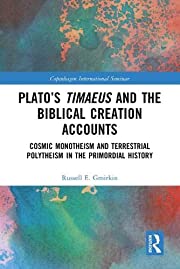
We have seen the evidence Russell Gmirkin [RG] set out for the authors of the Pentateuch drawing upon Plato’s works so it is against that background that this focus on Genesis and Timaeus proceeds. Chapter 4 of Plato’s Timaeus and the Biblical Creation Accounts “examines various lines of evidence that indicated Genesis 1 did in fact draw on the Timaeus“.
RG’s discussion engages with several related scholarly views and the current mainstream understanding that he is challenging. It is a somewhat technical presentation, examining the textual structures and how related Platonic themes (science, philosophy, myth) are expressed through each. For better or worse, I have decided to touch on the more obvious overlaps between Genesis 1-2 and Timaeus with little comment. I imagine you, dear reader, are sitting with fellow critical jurors.
–o–

First to the witness stand is Martin Rösel [MR]. MR listed clear indications that the Greek version of Genesis made liberal use of terms from Timaeus. MR’s explanation for these references was that the translators felt free to modify, even change, the original Hebrew text.
- e.g. Thus Genesis 1:2, in Hebrew, speaks of the earth being “empty and void” but the early Greek version of Genesis is unusual in that it speaks of the earth being “invisible and unformed”, an expression reflecting Plato’s cosmology in Timaeus.
But under cross-examination of further studies, MR’s explanation that the Septuagint (LXX) was a very free translation of a Hebrew text could not stand up. The DNA evidence demonstrated that the LXX was an attempt to hew closely to the literal Hebrew original and not a free translation. The LXX can make for awkward reading in ways that indicate that the translators struggled to maintain faithfulness to a Hebrew source.
But what was the Hebrew source of the Septuagint? It was not our current “Masoretic text” (MT). Interestingly, in some places where the LXX disagrees with the MT, other earlier Hebrew versions do match the LXX translation (e.g. the Samaritan Torah, a Dead Sea Scroll fragment).
RG’s conclusion:
the LXX was not a free translation of the underlying Hebrew text . . . but rather a literal translation of a non-MT text [an earlier Hebrew text] of Genesis (RG, 86)
What does the mainstream scholarship say about all of this? The dominant view is that there were Hebrew and Greek versions of the Pentateuch long before our current MT and LXX. Neither of these earlier, now lost, texts could have reflected Plato’s Timaeus. It is acknowledged that Timaeus did influence some parts of the LXX of the third-century BCE. The question remains, though, Why is the LXX so different from the MT?
–o–

Next witness: Emmanuel Tov.
What version of Genesis 1 came first? The MT or LXX?
Definitely the MT. A copy was kept in the temple and was used as the standard by which all copies were measured.
Where did the LXX come from?
I can’t help but think that it came from a tradition that stood opposed to the temple authorities.
Why, then, does the Letter of Aristeas say that the temple authorities sent a Hebrew text to Alexandria for translation into Greek?
I don’t believe that that story has any truth to it. It is total fiction. The LXX had to come from a group opposed to the Temple authorities. The temple authorities would have sent a copy of the MT and the LXX would be far closer to the MT than it currently is.
But then where did the LXX come from?
I can’t say anything other than what I have said already.
–o–
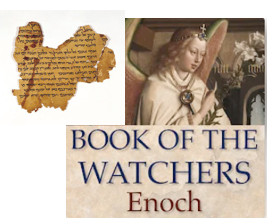 Next witness: Four figures enter the dock — the Book of Watchers, Demetrius the Chronographer and the Book of Jubilees and Qumran (Dead Sea Scroll) fragments. All of these testify to being the first to quote or allude to biblical writings. Not one is any older than the third century BCE.
Next witness: Four figures enter the dock — the Book of Watchers, Demetrius the Chronographer and the Book of Jubilees and Qumran (Dead Sea Scroll) fragments. All of these testify to being the first to quote or allude to biblical writings. Not one is any older than the third century BCE.
Conclusion:
It . . . goes beyond the evidence to assume that the Hebrew Bible in any form, whether MT or proto-LXX, significantly predates the Septuagint translation. (RB, 88)
–o–
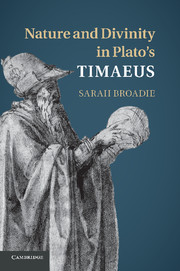 Next witness: Timaeus, the astronomer created by Plato. Timaeus is asked about the three different creation narratives or myths he described to his companions: the creation of the cosmos; how the elements that enabled and brought about order emerged from primordial chaos; the creation of mortal plant and animal life, including humans. The court asks Timaeus to outline his presentation. He does so:
Next witness: Timaeus, the astronomer created by Plato. Timaeus is asked about the three different creation narratives or myths he described to his companions: the creation of the cosmos; how the elements that enabled and brought about order emerged from primordial chaos; the creation of mortal plant and animal life, including humans. The court asks Timaeus to outline his presentation. He does so:
I began by telling my audience, Socrates among them, that I was going to describe how “in the beginning” the universe was “generated” (Greek “genesis”), that “in the beginning”, a good God “made” the “heaven and earth”.
The Greek words in quotation marks match those in the LXX of Genesis 1. The judge instructs Timaeus to stop “finger-quoting” and get to the point and list only the details of the visible creative process.
If I restrict myself to the order of the creation of the visible universe….
It all begins with chaos and darkness. (Gen 1:2; Timaeus 30a)
Then light is introduced. (Gen 1:3-4; Timaeus 31b, 39b)
From this point we have day and night. (Gen 1:5; Timaeus 39c-d)
The στερέωμα used in this verse to translate רָקִיעַ (raqia) raises some questions: In Greek before the LXX the term was used only in the sense of ‘foundation, skeleton’, but not in the meaning ‘solid body’ for the heavens. Thus, it seems that the translator has made a new coinage of the content of the term at this point. It cannot be decided whether the translator knew the basic meaning of the Hebrew root רָקַע “to spread out, to stamp, to hammer down” or the “cosmological technical term” רָקִיעַ, which presupposes a shell-like construction of the vault of heaven. It is questionable why a term was used here that had not been used in cosmological contexts before. The only trace, as far as I know, leads once again to Plato’s “Timaeus”. (Martin Rösel: p. 36 – translation)
Gen 1:24 is the only place in the LXX where “tetrapods” is used to translate the Hebrew “behemoth”. MR suggests Plato is behind this classification of animals according to whether they have many legs or are legless. In Timaeus the four-legged creatures are classified as less rational than two-legged and upright humans, and the legless the least rational of all. (p. 47)
The earth and skies are separated. (Gen 1:6-7; Timaeus 32b, 53a)
There is a dome, a firmament (στερέωμα = stereoma), set above the earth. (Gen 1:6-7, 14-15; Timaeus 33b)
The earth and seas are then separated. (Gen 1:9-10; Timaeus 53a)
Then plants are made on the earth. (Gen 1:11-12; Timaeus 77a-b, 80a)
In order to measure time, the days, months and years . . . (Gen 1:14; Timaeus 37d-e, 38b,e, 39b)
. . . the sun, moon and planets are created and set in orbit (Gen 1:14-18; Timaeus 38c-39b, 40a)
Next the sea creatures and birds were made (Gen 1:20-25; Timaeus 40a)
then the earth brought forth four-footed beasts (τετράποδα = tetrapoda)
Then humankind (Gen 1:26-28; Timaeus 41c-d, 42a,c)
The cosmos was thus completed and the Creator returned to his former state of rest (Gen 2:2-3; Timaeus 42e)
Mortal life was then created by the children of that Creator. (Gen 2:4-25; Timaeus 40d-47e)
But that is only the bare bones and a major theme that I elaborated upon was theology, a term Plato has happily invented for me to use. I was proposing the reason God had for creating the cosmos, and why it is so good and beautiful, and how it was that we have death and corruption in a world created by a perfect and good God.
With all of that I also gave a good scientific thesis of how the different elements that make up everything in our visible universe emerged out of chaos, how diverse geometric shapes led to like attaching to like, how these different shapes became fire, air, earth and water, how heavy and light substances found their respective places, how all the similar substances all collected together to form land masses and seas, lighter bodies in the heavens above, etc. All very scientific.
Finally, I came to a more detailed myth, a plausible one, I think, of how humans came to be what they are. Should I continue?
Yes, but keep it brief.
The first man was created (Gen 2:7; Timaeus 69a-80e)
then I had a long discussion of how the bones, flesh and respiratory system were made (Gen 2:7, 21, 23; Timaeus 73e-75c, 77c-79e)
I mentioned plants again (Gen 2:9; Timaeus 77a-b, 80e)
and the creation of animals (Gen 2:18-20; Timaeus 91a)
and then the creation of woman (Gen 2:21-23; Timaeus 91a-c)
and the origins of sex (Gen 2:24; 3:16; 4:1; Timaeus 90d-91c)
Is that all?
Well, part of my discussion about the origins of sex included the origins of homosexuals but I doubt that is relevant to your investigation into ideas that made it into the Bible…. Oh, there were some other details…
I did compare the desire for sex leading to the act to an image of eating the fruit of a tree (Gen 3:2-3, 6; Timaeus 91c)
and I said the serpent, that legless creature, was the “lowest” (pun, haha) of all animals (Gen 3:14; Timaeus 92a)
–o–
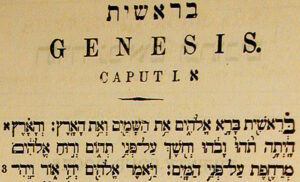 Next witness: Genesis 1 and 2, MT, is called to the stand. The clerk shows the court a tray of cards with texts written in them.
Next witness: Genesis 1 and 2, MT, is called to the stand. The clerk shows the court a tray of cards with texts written in them.
Did you steal these texts from Plato? I will read them out and you can tell us where you found them.
“without form and void” (תֹ֙הוּ֙ וָבֹ֔הוּ) — sounds like something from Timaeus 51a.
“Let there be …” (יְהִ֣י) — from Plato’s discussion of genesis, of coming into being in Timaeus 27d-29e?
And God saw that it was good (טוֹב) … it was good (טוֹב) … saw that it was good (טוֹב) …. was good (טוֹב) … God saw that it was good (טוֹב) — reminders of Timaeus 29a, 87c, 92c?
Let there be a dome of the firmament (רָקִיעַ) — as we read in Timaeus 31b, 43c, 33b
Let the earth bring forth cattle and legless creatures — from Timaeus 92a?
And God said, Let the earth bring forth… the fruit tree yielding fruit after its kind (מִין), … and the earth brought forth grass … after its kind (מִין), … after its kind (מִין) . . . And God created … every living creature … after its kind (מִין),… after its kind (מִין), … after its kind (מִין) … — as says Plato in Timaeus 91d (92b)
God said, Let us make man … after our likeness (דְּמוּת) — compare Timaeus 30c, 39e
God said, Let us make man in our image (צֶלֶם) … so God created man in his own image (צֶלֶם), in the image (צֶלֶם) of God… — compare Timaeus 29b-c, 37d
God fashioned (יָצַר) the man — from Timaeus 42d, 73c, (78c)?
God completed (כָּלָה) his work — from Timaeus 92c?
God created every living soul (נֶפֶשׁ) that moves . . . God said, Let the earth bring forth the living soul . . . — Timaeus 42e?
No comment.
–o–
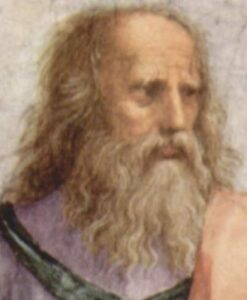
Last witness: Plato.
Please tell the court what concepts you were keen to express when you wrote Timaeus.
I wanted to get across the idea that God had a purpose that was expressed at every stage of his creation of the cosmos.
How did you do that?
I began by explaining that God had a plan, a particular idea that he wanted to carry out at each stage. So for example, I would state that he willed to do something, and then that he carried it out. But the higher purpose of all of this was that he wanted to create everything that was “good” and beautiful. God, I explained, is good, and that’s why he had a plan to create everything good, just like himself.
Let me read extracts from another myth, not the one told by Timaeus, and tell the court if it is a fair reflection of what you wrote about God’s purposeful acts:
And God said, “Let there be light,” and there was light. God saw that the light was good . . .
And God said, “Let there be a firmament between the waters to separate water from water.” So God made the firmament . . .
And God said, “Let the water under the sky be gathered to one place, and let dry ground appear.” And it was so. . . . And God saw that it was good.
Then God said, “Let the land produce vegetation: seed-bearing plants and trees . . . And it was so. . . . . And God saw that it was good.
And God said, “Let there be lights in the firmament of the sky to separate the day from the night . . . and let them be lights . . . to give light on the earth.” And it was so. . . . And God saw that it was good.
And God said, “Let the water teem with living creatures, and let birds fly above the earth . . . . So God created the great creatures of the sea and every living thing with which the water teems . . . and every winged bird . . . And God saw that it was good. God blessed them and said, “Be fruitful and increase in number and fill the water in the seas, and let the birds increase on the earth.”
And God said, “Let the land produce living creatures according to their kinds . . . . And it was so. . . . And God saw that it was good.
God saw all that he had made, and it was very good.
Is that an accurate reflection of the purposeful God you wrote about?
It’s somewhat simplistic as a scientific account but yes, it certainly captures the essence of the theological idea I set out about God as a craftsman.
Tell us more about your God.
The Creator God I wrote about was a skilled Craftsman, a Demiurge, and the Father of the entire cosmos. We know how artisans work: they take an unformed lump of stuff, set their sights on an ideal image or model that they want to reproduce, and then work away until they have a perfect, beautiful copy of that model.
But my craftsman god went another step and wanted to create different species that produced their own kind, in their own likeness, too — as birds generate other birds like themselves, various animals do the same, all reproducing in their own likeness and kinds.
Your God sounds like a person.
Oh yes. He has a speaking role, too, especially when the time comes to create humans. There were other gods, too, lesser ones, and God called them together to discuss with them a plan to make mortal animal life and humans. The supreme God could not create mortality because he’s perfect and mortality is less than perfection. So he arranged for his lesser companions to work on that.
Are you saying that “God said, ‘Let us make man …”?
Yes. It was a team effort, you see. The supreme Artisan made the immortal soul that was to be planted into mortals, but the lesser gods made the mortal bodies that were to house that soul. So yes, it was a team project. God discussed it with his fellow gods before proceeding.
After a short break the questioning of Plato resumes.
So in the speech you put in Timaeus’s mouth you said God created everything good according to a beautiful model and some living things continued to reproduce themselves.
There was more to it than that. Everything was divided into different entities. Creation was a series of separations. Heavens from earth. Waters above from waters below. Dry in one place, wet in another. Earth together and seas together. Then there were five kinds of living souls: the moving planets and stars, birds of the air, fish of the sea, animals of the earth, and vegetation. And each of those entities has its own separations into different classes: grass that grows seed directly and trees that grow fruit that contain seed; animals that walk on legs and those that crawl on ground; and so forth.
Is that all?
No. One more thing. Everything had its proper name.
Do you mean something like what we read in Genesis 1-2:
God called the light “day,” and the darkness he called “night. . . . And God called the firmament Heaven. . . . God called the dry ground “land,” and the gathered waters he called “seas.” . . . God brought the wild animals and birds of the sky to the man to see what he would name them; and whatever the man called each living creature, that was its name. So the man gave names to all the livestock, the birds in the sky and all the wild animals.
Yes, and studying the name is important because it tells us something about the thing named.
As in Adam meaning earth?
Yes. In Greek the word “woman” (γυνή = gynḗ)) sounds like the word for “birth” (γονή = gonḗ)
The Hebrew counterpart would be naming the woman Eve meaning life because she is the mother of all living.
Indeed. Names are most significant.
–o–
The jury members are free to think over what they have heard.
Gmirkin, Russell E. Plato’s Timaeus and the Biblical Creation Accounts: Cosmic Monotheism and Terrestrial Polytheism in the Primordial History. Abingdon, Oxon New York, NY: Routledge, 2022.
Niesiołowski-Spanò, Łukasz. “Primeval History in the Persian Period?” Scandinavian Journal of the Old Testament 21, no. 1 (January 2007): 106–26.
Rösel, Martin. Übersetzung als Vollendung der Auslegung: Studien zur Genesis-Septuaginta. De Gruyter, 2012.
Runia, David T. Philo of Alexandria and The “Timaeus” of Plato. Leiden: Brill, 1986.
Tov, Emanuel, trans. Textual Criticism of the Hebrew Bible. 3rd edition. Minneapolis, MN: Fortress Press, 2011.
Wajdenbaum, Philippe. Argonauts of the Desert: Structural Analysis of the Hebrew Bible. London ; Oakville: Equinox Pub., 2011.
Neil Godfrey
Latest posts by Neil Godfrey (see all)
- What Others have Written About Galatians (and Christian Origins) – Rudolf Steck - 2024-07-24 09:24:46 GMT+0000
- What Others have Written About Galatians – Alfred Loisy - 2024-07-17 22:13:19 GMT+0000
- What Others have Written About Galatians – Pierson and Naber - 2024-07-09 05:08:40 GMT+0000
If you enjoyed this post, please consider donating to Vridar. Thanks!

I love this style of presenting an argument. It helps to weigh them up.
“he legless the least rational of all”
I have been in Newcastle town centre on a Friday night and I can testify as to the accuracy of this.